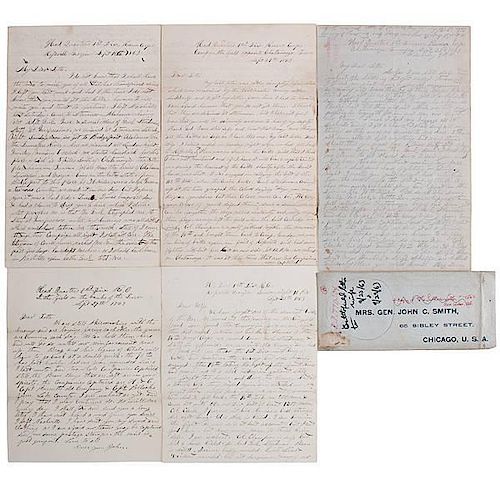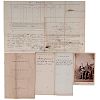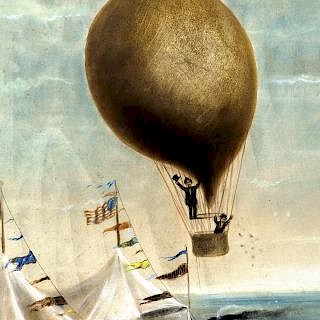Bvt. Brig. General John C. Smith, 96th Illinois Infantry, Civil War Archive including Series of Chickamauga Campaign Letters
About Seller
6270 Este Ave.
Cincinnati , OH 45232
United States
With offices in Cincinnati, Cleveland and Denver, Cowan’s holds over 40 auctions each year, with annual sales exceeding $16M. We reach buyers around the globe, and take pride in our reputation for integrity, customer service and great results. A full-service house, Cowan’s Auctions specializes in Am...Read more
Two ways to bid:
- Leave a max absentee bid and the platform will bid on your behalf up to your maximum bid during the live auction.
- Bid live during the auction and your bids will be submitted real-time to the auctioneer.
Bid Increments
| Price | Bid Increment |
|---|---|
| $0 | $25 |
| $500 | $50 |
| $1,000 | $100 |
| $2,000 | $250 |
| $5,000 | $500 |
| $10,000 | $1,000 |
| $20,000 | $2,500 |
| $50,000 | $5,000 |
| $100,000 | $10,000 |
About Auction
Jun 13, 2014 - Jun 14, 2014
Cowan's Auctions dawnie@cowans.com
- Lot Description
38 items.
In late 1862, John Corson Smith (1832-1910) of Galena, IL, volunteered for service in the Union Army, and was commissioned Major of the 96th Illinois Infantry. The regiment saw its first major battle at Chickamauga, where, as part of General James B. Steedman’s brigade, it arrived just in time to save Rosecrans’ Army of the Cumberland from annihilation. Smith, helping rally troops on the right wing, gave the command to the 22nd Michigan to defend their position with the bayonet.
Smith, who served much of the war on General Steedman’s staff, rose to the rank of Lt. Colonel, and was brevetted Brigadier General in June 1865 by his old pre-war friend, General U.S. Grant. After the war, Smith returned to his career as a building contractor, making his fortune in Chicago after the Great Fire of 1871. He also served as Lieutenant Governor of Illinois from 1885 to 1889. Smith was known as one of the most active Masons in the United States. He was buried in Galena with full Masonic orders.
This archive of mostly war-date items includes several letters Smith wrote to his wife, with battle content from Chickamauga and preceding engagements.
On September 18, 1863, he writes his wife about the hard ride with other officers across Tennessee to Rossville, GA. He arrived just in time to accompany Steedman’s probe towards Ringgold. He goes into great detail about the skirmish and artillery duel, as well as the ambush of their camp the next night by Confederate forces.
Late on the night of September 20, the first day of the bloody Battle of Chickamauga, Smith writes from the battlefield, describing in detail the 96th’s fight against Longstreet. In part:
Dear wife, We have fought one of the severest battles of the War… We fought two hours and drove the enemy, but at terrible loss. They massed again and attacked us. We fought them until dark, when we ran out of ammunition and had to fall back. The 96th took in 500 men and came out with 50. Our div lost at least 1200 men.
Smith runs down the list of all the wounded and killed officers and friends, noting: Many of our boys were left on the field. I feel we shall have it as warm tomorrow… Oh, for large reinforcements! If Burnside only comes up, and forces from Grant, we may turn the tide and end this war in the South West, but if we lose this battle, we shall have to fight them again… Our Corps and Gen’l Thomas’s fought 100,000 Rebs today… many of our Galena boys are no more.
He closes by giving his wife and young boys his love, saying Tell them to love their father’s memory if he should fall, and love the flag he fought for, and under which he may die before this Campaign is ended… Love every one of the 96th, for they have done nobly. No Regt on the field have done better.
Late on the night of September 23, Smith writes of the fighting retreat to Chattanooga, where the regiment is dug-in at the foot of Lookout Mountain: A more dirty set of men you never seen, from the Genl down… We have had some hard fighting. On Sunday night I wrote you just as we had returned from the battle field. The 1st Div of the R[eserve] C[orps] have won imperishable glory, and first in the Div is the 96th Ills. We saved the army. Genls McCook and Crittenden were whipped and in full retreat for Chattanooga before our div got into the fight, but we saved Genl Thomas and his Corp from complete defeat and capture, and we got the credit for it. But, dear Wife, we done it at a terrible cost…The 2nd brigade of our Div lost about 1200 killed and wounded. The 22nd Michigan, temporarily attached to our Div were cut to pieces. All the troops got out of ammunition at dark, which caused us to fall back. Col LaFever of the 22nd asked me what he should do, as he had no cartridges & the enemy was pushing him. I told him to give them COLD STEEL. He done so, and has never been seen or heard of since, but he saved us and has made a brilliant record.
Smith sends his sword and clothing to his wife, who is as close to the front as she can get, in Nashville. Bragg is besieging Chattanooga, and Smith doesn’t want his sword or dress uniform to be captured. On September 29, he writes about the most memorable event he saw during the battle at Chickamauga:
It was in the heaviest of the battle, shortly after the Genl’s horse was shot. I was engaged in rallying the left of the 115th Ill, when the center broke. Genl Steedman, coming up at the time, grasped the colors, saying “Boys, you may disgrace yourselves, but these Colors never can be. I’ll carry your Colors if you will defend them.” Such a scene can never be forgotten. The boys rallied instantly and nobly defended their flag. We only left the field when the last cartridge was fired. Col. Champion and myself gathered together the remnant of the 96th and brought them back to camp.
Other items include a roll of the Field and Staff of the 96th Illinois, dated September 6, 1862; the last muster roll of the officers of the 96th, with their fates; Smith’s muster out as Major on October 31, 1863, and muster in as Lt. Colonel the next day; and a war-date ALS from General Giles A Smith.
Perhaps the best war-date document aside from the battle content is an extremely entertaining report by Major George Hicks. Hicks, commanding the 96th while Smith was on Steedman’s staff, recounts the regiment’s march and foraging from Pulaski, TN to Huntsville, AL, in December 1864 – the miserablest, muddiest, rainiest, freezingest march for that distance that we have made.
Post-war items include a published battle memoir by Smith of his experience at Chickamauga, dated 1894; a 1910 MOLLUS memoriam of Smith; seven Annual Returns of the Galena Masons chapter (where Smith was T. I. Master); and a post-war cabinet photo of Smith and his wife. - Shipping Info
-
SHIPPING. At the request of the buyer, Cowan's will authorize the shipment of purchased items. Shipments usually occur within two weeks after payment has been received. Shipment is generally made via UPS Ground service. Unless buyer gives special instructions, the shipping method shall be at the sole discretion of Cowan's Auctions, Inc.. Cowan's is in no way responsible for the acts or omissions of independent handlers, packers or shippers of purchased items or for any loss, damage or delay from the packing or shipping of any property.
-
- Buyer's Premium



 EUR
EUR CAD
CAD AUD
AUD GBP
GBP MXN
MXN HKD
HKD CNY
CNY MYR
MYR SEK
SEK SGD
SGD CHF
CHF THB
THB





